Episode 53: Whistleblowers

Untreated spinal conditions, rusty medical equipment, and a fly infestation are a few of the complaints alleged by a group of doctors at the VA Medical Center in Manchester, New Hampshire. We speak with a reporter who’s following the story. And a Massachusetts man, in prison for murder, fights to get a new trial after over 30 years in prison. Plus, we bring you the brief and fascinating history of a little-known anti-immigration party that swept the Massachusetts government in 1854, and more.
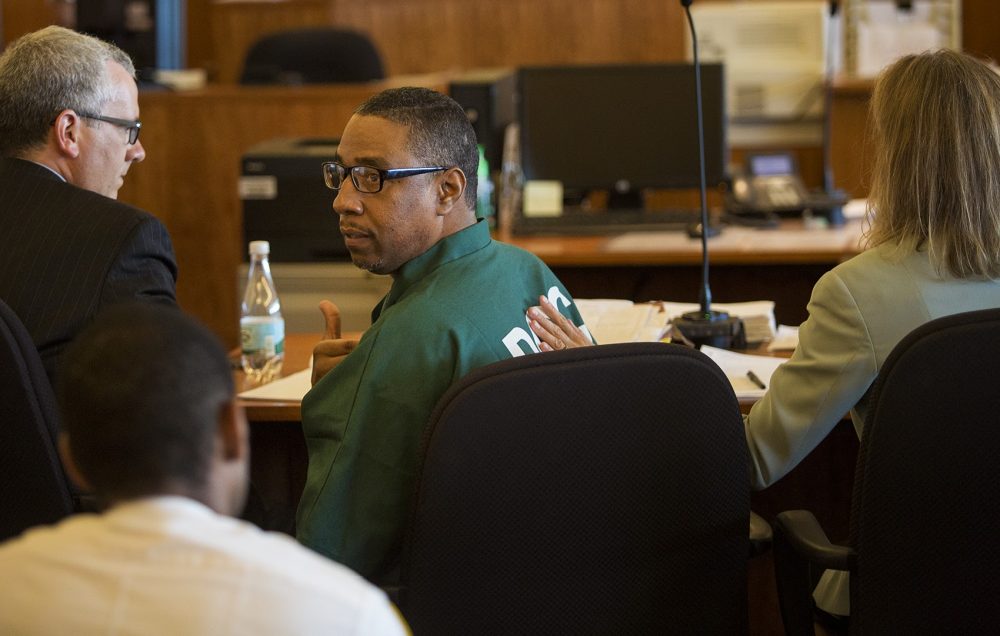
Darrell “Diamond” Jones, a man convicted of murder more than three decades ago, is seeking a new trial. He appeared at a hearing in a Fall River, Massachusetts courtroom Tuesday. Photo by Jesse Costa for WBUR
Casting Doubt
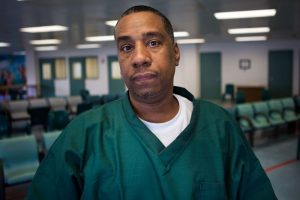
Darrell “Diamond” Jones was convicted of the 1985 murder of alleged Cuban cocaine dealer Guillermo Rodriguez in Brockton, Massachusetts. Photo by Jesse Costa for WBUR
There was dramatic testimony during an unusual hearing in a Fall River, Massachusetts courtroom on Tuesday. Darrell Jones, a man convicted of murder more than three decades ago, is seeking a new trial.
Tuesday’s hearing raised questions of racial bias by jurors. And a key juror who alleged the discrimination said that she was never summoned to court to testify. WBUR’s Bruce Gellerman has the story.
Last year, Bruce Gellerman and Jenifer McKim of the New England Center for Investigative Reporting collaborated on an investigation of Darrell Jones’ case.
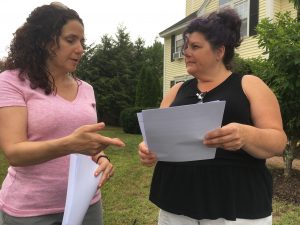
Carol DiPirro talks with neighbor Andrea Inamorati about a health survey following water contamination in Merrimack, New Hampshire. Photo by Emily Corwin for NHPR
Over a year ago, residents near Merrimack, New Hampshire learned their drinking water had been contaminated by emissions from a nearby plastics plant. The chemicals found in area wells, known as PFAs, have been linked to thyroid disease, cancer, immune system changes, and other health problems.
Some residents there now say state and federal officials still aren’t doing enough to protect them. A few neighbors are taking things into their own hands. New Hampshire Public Radio’s Emily Corwin reports.
Every day, nearly a million commuters travel on the Northeast Corridor — the rail network between Washington, D.C. and Boston. Many of those passengers cross over a small river in the coastal city of Norwalk, Connecticut. But the only way for a train to get across that river is via a 120-year-old “swing bridge,” which rotates to let boats pass.
And sometimes that bridge gets stuck mid-swing, causing chaos for commuters. State officials want to replace the deteriorating bridge, but locals worry about collateral damage. WNPR’s Ryan Caron King reports.
Un-Cared For
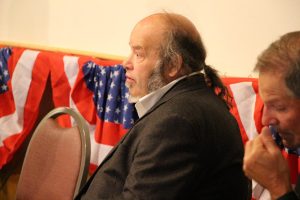
Ed Kois, one of the doctors who went public with allegations of substandard care at the Manchester VA. Photo by Peter Biello for NHPR
The Veterans Affairs Medical Center in Manchester, New Hampshire has come under fire for allegedly delaying care to some patients with spine conditions, resulting in their paralysis.
Whistleblowers also allege that the purchase of important medical equipment had been delayed because of budgetary concerns. And the medical center has been struggling with an infestation of flies for at least a decade.
These were some of the concerns doctors brought to VA investigators, who took no action. But when these same concerns were reported by the Boston Globe Spotlight Team, response from the VA was swift.
Our guest Peter Biello covers veterans affairs for New Hampshire Public Radio and has been following the story as it develops.
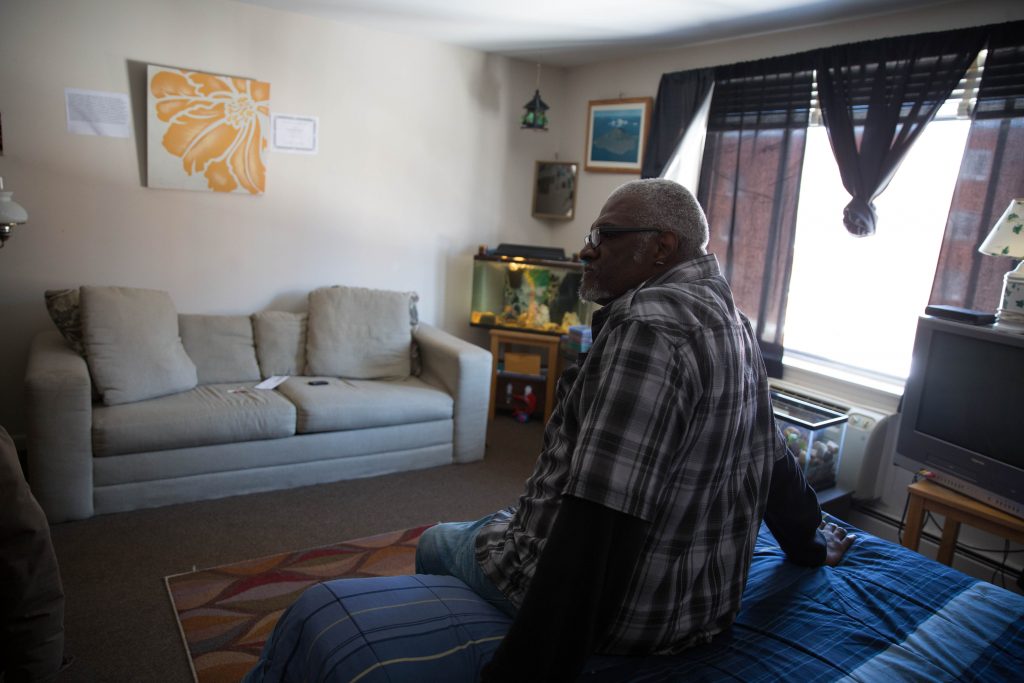
Reggie Moton of Hartford, Connecticut suffers from depression and substance use disorder. Moton was homeless for 20 years before a nonprofit called Journey Home found him this apartment in 2016. Photo by Ryan Caron King for NENC
Between a quarter and a third of homeless people have a mental illness, and roughly that same percentage suffers from substance abuse disorder. Columnist Susan Campbell, who writes about housing and homelessness for the New England News Collaborative, told us the story of one man, Reggie Moton, who fits both of these categories. Campbell says Moton illustrates the years of systemic neglect of mentally ill homeless people in New England.
Read Susan Campbell’s column and watch a video interview with Reggie Moton below.
Know Nothings

The flag of the mid 19th Century American Party. The party was commonly known as the Know Nothing Party because when asked about their secretive meetings, members were instructed to reply, “I know nothing.”
Back in January, Boston Mayor Marty Walsh spoke in defiance of President Trump’s executive order promising to strip funding from so-called sanctuary cities — cities like Boston, where local police do not detain or question anyone based solely on their immigration status. At a press conference, Walsh said immigrants fearing deportation could live in City Hall if they wished.
And as we’ve reported, leaders of other Massachusetts cities have embraced immigrant-friendly policies.
But back in the 1850s, a new political party — formed in opposition to waves of European immigrants — swept to power in Boston and other Massachusetts cities, and captured the state legislature by a landslide.
Anna Fisher-Pinkert tells the story of the Massachusetts Know Nothing Party. The piece was originally produced for the Commonwealth Museum in Boston.
About NEXT
NEXT is produced at WNPR.
Host: John Dankosky
Producer: Andrea Muraskin
Executive Producer: Catie Talarski
Digital Content Manager/Editor: Heather Brandon
Contributors to this episode: Peter Biello, Susan Campbell, Ryan Caron King, Emily Corwin, Bruce Gellerman, Anna Fisher-Pinkert
Music: Todd Merrell, “New England” by Goodnight Blue Moon
We appreciate your feedback! Send praise, critique, suggestions, questions, story leads and photos of your favorite New England bridge to next@wnpr.org.
